#anti Kate harron
Text
After the … horrible*cough* … most deep and tragic, but certainly not satisfying conclusion of the Loki series, I would like to randomly cite one of the writers of Thor (2011) with a random advise for aspiring and established script writers. 🙂
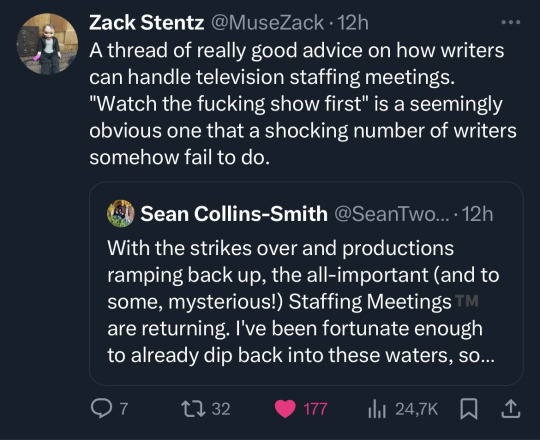
That’s all. 🙂
#loki series negativity#loki series criticism#Loki series critical#anti-Waldron#anti Kate Herron#anti Kate harron#sorry for my dyslexia#anyway#endless mcu salt#sarcasm#yes that introduction included some
209 notes
·
View notes
Text
Stephen Piccarella, Charles Manson Was a Republican, The New Inquiry (August 5, 2019)
Long incorrectly associated in the public mind with the political left, Manson wasn’t merely conservative; he might as well have been a Fed

THE first time you see him, you barely notice him. He’s posing for a group photo, poking his head over the shoulders of two people you recognize. You have to see his face a few times before you begin to recognize him too, but soon enough you do. He’s showing up everywhere now, at a party with Sky Ferreira, in front of a media wall at a film festival with James Franco, on the beach with Justin Bieber. He’s slight and messy, but his face tattoo and rattail are distinctive enough to brand him somewhere between Jersey Shore and inzane_johnny. When you see him in one of Kanye’s selfies, you scroll through the comments looking for his name. A few of the commenters mention a Chad. You Google “kanye+chad” until you find a verified Instagram account with 100,000 followers. The bio reads “LOVExHATE // LIFExDEATH // ALLxONE,” and the handle is @ChadMansonOfficial.
You start following Chad on all social-media platforms. He often likes and occasionally reposts articles about himself; Vice develops a beat. Along with the rest of the world, you slowly get to know Chad and his singular lifestyle brand, part edgelord, part corporate woke. The elitist one percent has destroyed the planet and defrauded the people, and the only way to cope is to lean into whatever means to liberation remain. He’s nonmonogamous, advocates for entheogens and their potential to treat PTSD, and vehemently distrusts both political parties. Your friends tend to shrug off the rumors about his entourage of younger women and their creepy orgies. You’re not sure if you buy his message, but media personalities of various stripes have found something to like about him, from Tucker Carlson to Cum Town. Then the Fader runs the headline “Chad Manson at work on debut mixtape produced by Kanye West.” You wonder when the first single will drop, but it never does.
Instead, one morning, you wake up to a stream of push notifications. At a party at Franco’s house in Hollywood, along with at least six other industry personalities, actress Margot Robbie—no, Kate Bosworth—no, wait, Hilary Duff—has been hideously murdered by still unidentified perpetrators. Not quickly enough, police apprehend Chad Manson. Early reports suggest that Manson has been plotting against the cultural elite for years, coaxing stars like Ed Sheeran, Lil Xan, and the FuckJerry guy into his orbit. After a long investigation, detectives determine that Manson orchestrated the murders after hearing Kanye’s album Yeezus, reading its lyrics as coded messages from a powerful representative of the Black community about the coming armed battle against the white race.
AUGUST 9, 2019, will mark the 50th anniversary of the Tate-LaBianca murders, better known as the Manson Family Murders, which took place in the early hours of the morning on August 9, 1969. In honor of the occasion, at least four new movies (Mary Harron’s feminist revision Charlie Says, Quentin Tarantino’s pop-historical epic Once Upon a Time in Hollywood, the more straightforward biopic Tate, and the pure exploitation The Haunting of Sharon Tate) and a new season of the Netflix series Mindhunter will dramatize the events in some way this year. Whether these projects are motivated by revisionism or nostalgia is unclear.
The most famous piece of writing about the Manson Family—besides, maybe, Helter Skelter, the true-crime account by Manson’s prosecutor Vincent Bugliosi—is Joan Didion’s essay “The White Album,” now considered a classic of cultural journalism. In the essay, Didion writes, “Many people I know in Los Angeles believe that the Sixties ended abruptly on August 9, 1969, ended at the exact moment when word of the murders on Cielo Drive traveled like brushfire through the community, and in a sense this is true. The tension broke that day. The paranoia was fulfilled.” This declaration can be interpreted any number of ways, but in the decades since its writing it has been reduced to a single, simple notion: The Manson Murders were somehow specific to, revealed something about, and effectively concluded “the Sixties,” whatever that was. They broke a tension and fulfilled a paranoia we associate with a historical moment defined, loosely, by “countercultural” behavior and activity. This has become the dominant narrative of the murders.
After Manson died in November of 2017, a flurry of thinkpieces appeared, most of which hardened this impression. “At the time,” the Atlantic reported, “Manson was seen as emblematic of the counterculture, living on a hippie commune with his followers, writing music, and dropping acid.” An op-ed in the Guardian alluded to “the widespread belief within the late 60s counterculture that he was innocent, a martyr who had been picked on by police as part of The Man’s war against the long-hairs.” On the right, the likes of Ben Shapiro and Kevin D. Williamson saw an opportunity, exaggerating and fabricating sympathies between Manson and leftist radicals and, in more than one case, Barack Obama. Articles in Vice and the New York Times compared Manson (more accurately) to the alt-right, but the prevailing interpretation is not exactly a collective misremembering. Reviewing Helter Skelter in 1975, the New Republic wrote, “It is hard to escape the conclusion that the Counterculture of the 1960s—which offered us beautiful music, new ways to live our lives, and the will to end the war—gave birth as well to Charles Manson.”
Hard nothing. Hardly anyone seems to want to try. But it’s not the growing leftist movement that’s rehabilitating Manson. That credit goes to the alt-right, Netflix, and Quentin Tarantino. If the ’60s counterculture was a failed attempt to take down the U.S. government, the Manson Murders were a failed attempt to accelerate its racist program. The boomers and Generation X were content, even happy, to remember the ’60s univocally as a freewheeling adventure against the Man, including Manson, but the evidence is thin.
The most enduring connections between Manson and radical leftists were drawn by Bugliosi, a prosecutor, who had no ear for hippie irony and no understanding of the culture’s contradictions. In a chapter of Helter Skelter listing assessments of Manson from the left, he offers, “The underground paper Tuesday’s Child, which called itself the voice of the Yippies, blasted its competitor the Los Angeles Free Press for giving too much publicity to Manson—then spread his picture across the entire front page with a banner naming him MAN OF THE YEAR.” The endorsement is more likely a reference to the publicity Bugliosi credits the paper with admonishing. After an anecdote about Yippie party founder Jerry Rubin visiting Manson in prison, Bugliosi admits, “Yet Charles Manson—revolutionary martyr—was a difficult image to maintain. Rubin admitted to being angered by Manson’s ‘incredible male chauvinism.’ A reporter for the Free Press was startled to find Manson both anti-Jewish and anti-Black. And when one interviewer tried to suggest that Manson was as much a political prisoner as Huey Newton, Charlie, perplexed, asked, ‘Who’s he?’”
Bugliosi’s most unfortunate contribution to this argument is this quote from Bernardine Dohrn, delivered at an SDS summit not long after the murders: “Offing those rich pigs with their own forks and knives, and then eating a meal in the same room, far out! The Weathermen dig Charles Manson.” This is the quote that no right-wing publication can seem to leave alone. But Bill Ayers, placing the quote back in the context of the speech for which he was present, refutes any ideas of its sincere support for Manson. The occasion and the subject of the speech was the recent death of Black Panther Fred Hampton, which the Weathermen assumed, not unreasonably, to be part of a racist government conspiracy curiously Mansonian in design. The comparison to Manson was meant to lament the media’s focus on the sexier story of the Tate-LaBianca murders rather than what to the Weathermen was the much greater and more politically significant crime. “This is what screams for our attention and our response,” Ayers remembers Dohrn continuing. “And what do we find in our newspapers? A sick fascination with a story that has it all: a racist psycho, a killer cult, and a chorus line of Hollywood bodies. Dig it!” It was simple sarcasm.
Dohrn’s juxtaposition of Manson and Hampton echoes in Didion’s juxtaposition in “The White Album” of Manson and the story of Black Panthers leader Huey Newton’s arrest for the murder of Oakland police officer John Frey. Both cases came about because of a deliberate police effort to target the Black Panthers. The New Republic review explains that “Helter-skelter was Charles Manson’s design for Armageddon: by committing crimes like the Tate-LaBianca murders and leaving clues to throw the blame on black power groups, Manson hoped to force a police crackdown on the blacks who would retaliate with war against the whites.” If “a police crackdown on the blacks” was the first phase of Manson’s plan for race war, then the FBI was already years ahead of him.
ANY examination of the Manson murders is incomplete if it ignores the U.S. government’s concurrent efforts to attack and undermine Black-power groups via espionage and violence, efforts made public in 1971 after the FBI’s papers documenting its counterintelligence programs were stolen and leaked to the press. After hearing The White Album, Manson directed his followers to murder Sharon Tate and her friends to try to frame the Black Panthers and incite a race war. At the time, we now know, police were seeking out the Panthers as part of a coordinated COINTELPRO effort, part of its aim being to demonize the Panthers as dangerous subversives with a threatening anti-white agenda. The main difference between Manson’s murderous efforts to provoke the Panthers and the FBI’s was scope. They were engaged in the same strategy and similar tactics.
Across five COINTELPRO programs, the FBI’s goals were broad but consistent: to suppress action by radical groups. The FBI wanted to neutralize any challenge to the prevailing order, of which white supremacy was (and remains) an inextricable part. One of the five COINTELPRO programs targeted white hate groups, but its documentation suggests that these groups only posed a threat to the FBI because their vigilantism threatened to subvert the government’s authority. Coordination between the different COINTELPRO programs to incite internecine struggle was also common enough in practice that the FBI might have infiltrated groups like the KKK to incorporate them into their operations against groups like the Panthers. The FBI workshopped so many plots against the Panthers that some of them probably sounded a lot like Manson’s.
The fantasy of white genocide that animated Manson permeates the highest levels of state power in this country. Manson may have been deluded enough to believe the Beatles knew who he was and cared enough about him to write him songs, but his racism wasn’t born of unique paranoia. Growing up in America in the middle of the 20th century, he could have picked it up pretty much anywhere. As is true of all white terrorists, what set Manson apart from other agents of white supremacy was not his hatred but his belief in his own personal importance.
The year 1988 was significant for white supremacists, many of whom use the number 88 as a symbol meaning “HH,” or “Heil Hitler.” Schreck and Rice both performed at an 8/8/88 concert that summer.All this notwithstanding, Manson’s direct connections to right-wing ideologues are not so easy to find. The best sources are in a document called The Manson File, published most recently by Feral House, an underground press with a record of publishing white supremacists, and an accompanying film called Charles Manson Superstar. The Manson File is a fanzine-style hodgepodge of drawings, photographs, and writings about and by Manson collected in 1988 by a group of Manson sympathizers including historically dubious experimental musicians Nikolas Schreck and Boyd Rice.* The file includes text by racialist extremist and Universal Order founder James N. Mason, whose name is so similar to Manson’s that even their fans occasionally mix them up. The equally choppy film includes a brief yet almost unwatchable interview with Mason, preceding a longer one with Manson.
Mason’s contributions to both productions are very hard to follow, both because they are extremely disturbing and because they make very little sense. Mason seems to refer to a years-long relationship between his Universal Order and the Manson Family, lasting at least into the ’80s, during which time the two groups discussed plans for race-based warfare on an ongoing basis. The book and the film both reproduce an image of the Universal Order’s official logo, a set of scales with a swastika imposed over the center. The logo was designed by Manson. A few years after the release of both documents, Mason’s collected writings were published, edited by Michael Moynihan, coauthor of popular Feral House title Lords of Chaos: The Bloody Rise of the Satanic Metal Underground, recently adapted as a major motion picture that erases its white-supremacist origins. Mason’s writings have since been rediscovered and adopted by Atomwaffen Division, the neo-Nazi terrorist group whose targeted guerilla efforts to assault and supplant the existing social order continue as of this writing.
These are Charles Manson’s friends and fans: murderous fanatics, deranged occultists, addled hipster racists, and conspiracy theorists of the QAnon variety. In a word, Nazis. They read his words and follow his lead and hide in plain sight with the government’s blessing as long as they don’t get in the way. Sure, Manson hung out with Dennis Wilson and Neil Young, but only to manipulate them. He definitely never hung out with Bernardine Dohrn. He’s not your dad’s distant friend who took too much acid and went off the deep end; he’s at once less and more familiar than that. He’s the estranged cofounder of the giant media outlet that laid you off. He runs a YouTube music-review channel you’ve been watching for years. Actually, he has a solo show opening next week at a gallery in LA. Check your calendar. You’re invited.
#charles manson#politics#conservatism#public image#murder#crime#analogy#murder groupies#culture#killer fandom#fandom#subcultures#tate-la bianca murders#manson family
0 notes
Text
So, I got this message today, and I though ‘why not try a theory I had for a while?’
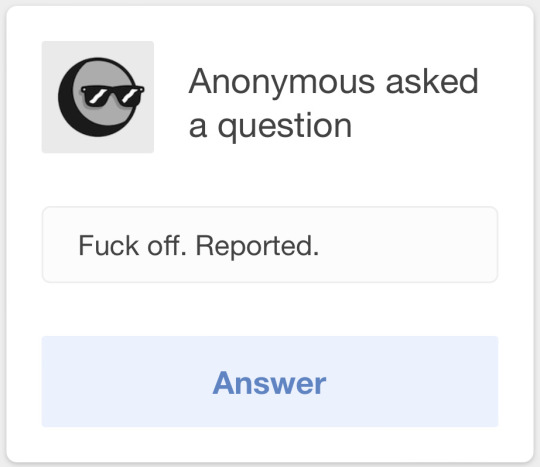
Tumblr allows you to block senders of those messages, even though you can’t see who it is. In former times you could just block the sender, and then go to the bottom of your block list to see who joined, but this was fixed by an update. As it turns out the block list gets sorted differently every time you go there.
So if you want to know the main blog of the sender, you simply have to screenshot the block list, then block the anon, and then do a second screenshot. You compare both screen shots, and voila - the main blog of the sender of the anon hate is revealed, in my case @katarinafx (the link doesn’t work because I have her blocked now).

In this case it’s clear the main blog is just a facade, since it has 1 entry, and no likes. but the pictures are telling. It’s Sanna Marin, prime minister of Finland, who was a while ago attacked for being dressed “too sexy”. Some people making this claims have apologized publicly, at least. As far as I can tell, it was a ridiculous claim from the beginning.
I rarely do things beside reblogs nowadays, so I conclude from the timing of the message that they were triggered by a comment I made about Kate Harron, and her annoying attempt to make us like her OC self-insert. Very likely the person who’s hiding behind this account is a sylki fan. Together with the pictures on the main blog I would not exclude the possibility of this person seeing each and every criticism of women as an attack on women in general. This is in good agreement with the habit of acting cowardly (sending anon hate AND hiding behind an empty main blog), not being able to provide real points or even being willing to engage in fact-based discussions instead of just spitting insults and threats.
And now that I wrote all this I do kinda see who people like this might feel represented by S*lvie. 🙈
#I found your tumblr Kate! 😝#/joke#those people can probably just identify with sylvie so well because both Kate and they consider men in general weak#and evil#and yet#they are still attracted by them#and that makes them angry#lol#die mad#anti Kate Harron#anti Loki series#Loki series critical#loki series criticism#loki series negativity
15 notes
·
View notes
Text
Distinguishing quality and preference concerning the Loki show
I’m tired, so please allow me to address some misconceptions people who liked the show have about us (the people who did not like the show).
1. “People hate the show because they can’t identify with Sylvie”
For me this one is true. I can’t identify with her, and I would say that’s probably because the show did a bad job of establishing her trauma. The first time we “see” her is in the song ‘I need a hero’ slaughtering Minutemen. That’s two opposing messages here: a) she’s supposed to be the hero, b) she’s slaughtering people who have not been shown to be evil by themselves. Yeah, they work for an evil organization, but they are only workers. Butchering them is at least a sign of bad taste. As soon we “meet” her properly, she TELLS us of her trauma. It is not SHOWN. (Please google the rule “show, don’t tell” for a longer explanation). I didn’t see her suffering, so all I have is my fantasy to picture her. The self-assured way, the heroic song, the cool outfit. Nothing indicates her suffering besides her words. Also, on TV things that are only told normally turn out to be lies or at least ambiguously framed.
-> This is a sign of the bad quality of the writing!
Also, I personally can’t stand Sylvie. She’s rude to my favorite character and while I am aware that in-universe she doesn’t have any reason to be nice and her backstory did not exactly involve many occasions to learn a respectful way around people it doesn’t endear her to me.
-> This is about preference and not the reason why I call her badly written. That I do because they didn’t show her backstory which would probably have done more to endear her to me.
2. “I’m baffled how many people failed to understand what the show is about.”
You see, “understanding” and “falling for it” aren’t the same. Yes, I get the show was structured as a classical redemption arc;
It gets established why the villain is bad: Loki is framed as a power-hungry narcissist who invaded New York solely to get a throne. He doesn’t even know why he wants one, but it’s his goal to rule.
A savior appears, showing the villain the consequences of his evil ways: Mobius video shows Loki that his former self’s evil deeds ended with him getting killed by Thanos. It also shows him, it was his hunger for power and revenge that led to Frigga’s death.
The villain agrees to help said savior but does it in truth for selfish reasons: Loki helps Mobius because he wants to meet the time keepers and possibly overthrow them, so he finally gets to rule.
Working together makes them build a relationship: That’s what the salat scene, Pompei and Mobius telling Loki he is sorry for the ice runt, shivering in the cold are for.
The villain betrays the savior in a critical moment, relapsing into his old, evil habits: Loki betrays Mobius by following Sylvie through the portal. He possibly plans to team up with her against the TVA.
There are consequences for the villain, showing him that his relapse destroyed the relationship he cherished already, because he never had one “real” relationship before: Mobius calls Loki a “bad friend”. Later Loki’s involvement leads to Mobius being pruned.
The villain is now outcast from the good side, and finds himself among fellow villains again, but realizes this doesn’t fit him anymore: Loki finds himself among the traitorous Lokis in the void, who are all power-hungry narcissists, except for Classic Loki, Kid Loki and possibly Alligator Loki, who managed to “fix themselves” as Classic Loki said.
The villain finds his new purpose in a relationship that makes him now fight unselfishly for the good side: Loki decides to fight for Sylvie’s goal even though she’s not even there for the positive feedback. Later he risks his life and sacrifices the Utopia Miss Minutes offers him.
So, why would one possibly hate that? BECAUSE LOKI HAS NEVER BEEN A NARCISSIST!! They redeemed something that NEVER WAS PART OF HIS CHARACTERIZATION!!! The redemption arc does not work if you considered Loki a good person at the beginning.
In the show, he needs to be a narcissist, power-hungry, and selfish because Mobius slide show is supposed to open Loki’s eyes to the bad consequences his behavior has for those he loves. Mobius standing by him is supposed to show Loki how being selfless pays off. Mobius calling him a bad friend is supposed to show Loki the consequences of relapsing into bad behavior. Sylvie is supposed to show Loki that he is as lovable as she is and that him enduring all that happened to him can be considered good quality. An internal value HE has just as much as she has, so there is no need for him to delve into power plays for something external to measure his value on.
Let me repeat that: If you consider Loki a good person who acted well-intending before and only happened to cause bad things by accident the REDEMPTION ARC DOES NOT WORK! Because you will have someone who wanted to protect Asgard from a war with other realms by delaying Thor’s coronation and ended up being tortured into compliance by Thanos ONCE AGAIN tortured, having to plead for his life. That is no redemption arc. Even if you include him admitting that he does not enjoy hurting people and he is afraid of ending up lonely (which is both in good agreement with his former characterization). It makes him just more miserable and the people who treat him like that even crueler. If Mobius wanted to manipulate this Loki into compliance, he would have shown him Thanos torturing him, threatening him to put him back into a time cell where Thanos does that over and over again. A morally good Loki had been aware of the bad consequences of his doings because he didn’t do the things for himself. His original source for self-loathing was that he was treated lesser by Odin, that whatever he tried, he never managed to be “worthy” and most of the time he was not even hearted. But he still was a good person, who tried to do the right thing for Asgard, protecting her people. Healing him would have demanded someone to acknowledge Loki was mistreated, to hear him out. Not to tell him how selfish and evil he was.
-> Loki has been known as a complex villain ever since Thor 1. Complex in this context means he's not simply bad because he's evil, but because his motives can be seen as honorable. The show changes that into him being one-dimensionally evil. A redemption arc not being tailored for the character it is about is a sign of bad quality.
I have been in the fandom ever since Ragnarok. I have both read and written endless metas on how he is a good person. I followed many meta writers because I loved to see their takes on how Loki endured mistreatment and still chose to spare this servant’s life who ridiculed him. Perhaps it is true that I only hate the show because it didn’t confirm my headcanons. But you know what? I loved the hero Loki. I hate the villain they made him in the show. And I hate how people are now saying Loki was never able to love someone before, denying his love for both Thor and Frigga that had been shown in the former movies. I hate how people who defended him against people who saw him only as a bad guy are now saying he rarely showed prosocial behavior (as if saving Asgard from Thor’s idiotic rule, or giving Thor his support and love if under the disguise of being Odin at the end of TDW would have been anti-social.)
So, to be entirely clear here: The show is anti-Loki.
It’s easy to miss since it is (supposedly) a show about him, putting him into the focus. But the show is biased against him, and it shows in many, many little details. One is that Loki gets mercilessly ridiculed. Scenes such as the slow-motion punch, him trying to argue for “fine Asgardian leather”, him threatening Alioth with a toothpick just to get ignored, and so many more scenes – those are NOT intended to show a person in a good light! If their goal was to make the show fun, there are other kinds of humor. There is snark (remember Avengers Loki), there is Loki playing tricks on others, there would be the possibility to humiliate OTHER characters. Neither Sylvie nor Mobius had been ridiculed in the show even once! Why not? In Thor Ragnarok, even Thor gets his share But not in the show.
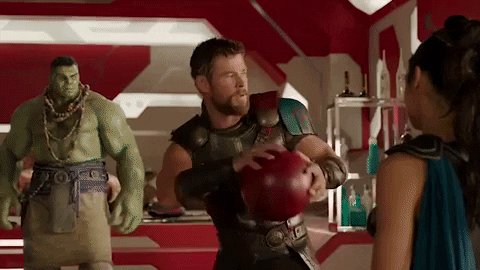
That was not by chance. That was intentional. It retconned his characterization into now being inherently evil shown by the fact that all Loki’s in the void are or have been evil.
For all those who like to argue the show was Tom’s baby and we have to like it because he liked it: in 2013 that “all he gets ‘he’s evil’, thanks”. Now he started an interview with “Loki is a comic book villain”, while looking dead inside. Only 5% of his ideas made it into the show. This trailer ridicules Tom speaking well about Loki. Waldron calls Loki an “ass”. How much more evidence do you need to see the creator's bias against him? As of yet, it might be possible to see situations like Loki challenging Alioth with a toothpick and say “you moron” lovingly. But how long will it stay like that? As I mentioned above – there are already people who like the show who are adapting the “Loki has always been evil rhetoric”. If this goes on, Disney will make you shit on him just as much as they are already doing. It does not matter we can now cite canon that Loki "never enjoyed hurting people" because the show made it canon he INTENTIONALLY hurt people to sate his hunger for power. It is not by accident the show never addressed him being tortured by Thanos because that is not canon for them. The Marvel wiki says he had been influenced by the scepter, like the Avengers when they started arguing. That is not the same as being tortured or mind-controlled. They (the creators of the show) made it canon that Loki himself acted on his own free will to invade New York and help Thanos because that is how they see him. As a villain who didn't care for anyone but himself.
If you enjoy the show, I am glad for you and a bit jealous because at least you got the Loki content you wanted or are somehow able to reconcile it with a conflicting view on him. But that is not my Loki. I loved the good man he had been in phases 1 and 2.
TLDR: Please stop telling me my reason would be that I can't identify with Sylvie or because I'm a misogynist.
#Loki meta#Loki series negativity#I have seen headcanons that tried to combine the TVA Loki with him not wanting to rule and still being tortured by Thanos#and I respect that#it's probably a way to make the show easier to stomach#but everyone who claims that would be more than a headcanon has still to provide evidence#because I didn't see any in the show#And i am deeply convinced the creators don't share that headcanon#if you have evidence i might have missed#please tell me#so i can update my opinion#and perhaps sleep a bit better#because i hate the show so much it pains me#they killed a beautiful heroic man with that shit#and made him a petty dump weak brat#anti-tva loki#anti mike waldran#anti kate harron
197 notes
·
View notes
Text
Sexism is sexism.
Misogyny, Misandry - makes no difference. The degree is irrelevant. Definitions blurred (especially with genderfluid characters). If I have to pay for strong female representation on-screen with the bashing of genderfluid people or men, I’d rather not watch at all.
TW for Loki show negativity
I have now seen people claim frequently that „if you didn’t enjoy the Loki series it might be due to (internalized or subconscious) misogyny.”
You see, if you get discriminated against for a long time, ‘equality’ and ‘getting revenge’ suddenly can get hard to separate. And since Loki might be a little bit too close for many of us to stay objective I would like to tell you about the He-man reboot, that just came out. Well, a series about a guy called ‘He-Man’ sounds as it should be about a Man, right? But instead the production crew decided to kill the titular character and make the show about his female side kick, enraging the fans who thought they’d get content about he-man. Similarly, some people praise the approach as progressive. Being completely uninvolved in that franchise I must say that it reminds me of the Loki show, especially the false advertising in the name of feminism, which might be in truth rather be (possibly subconscious) misandry/genderfluidphobia.
The question if it’s rather misandry or genderfluidphobia/enbyphobia depends if you see Loki as a cis man or genderfluid. I see him as genderfluid, but the show painted him mostly as male-presenting and I could hardly find any indication of him being genderfluid beside that line of text in the opening sequence, so I assume most casual viewers will perceive him as a cis man. That’s why I decided on using “misandry”, but it’s just as much genderfluidphobia.
Until today, the film industry is dominated by men, which shows in the gender ratio before and behind the camera as well as wage gaps and many more points that stand in the way of equality. And make no mistakes, these points still need to be addressed!
But we must not forget that men are people, too! They can also be targeted by sexism, discriminated and even assaulted because of their gender. Sometimes this even happens under the pretense of „equality“, as if a new wrong could make an old wrong right.
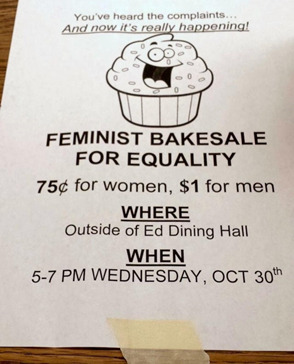
Movies are a powerful tool for discrimination since subtle messages get absorbed and influence the audience subconsciously. In fact, the influence of those sexist narratives is higher when we don’t notice them, and the methods are many. Here is a short selection of frequently used methods.
1. Women are reduced to sex objects. Additionally, sexual assault is not be recognized by the narrative and never addressed outside of its immediate plot purpose. This adds to the normalization of assault on women. It is shockingly prevalent in older movies.
2. A lack of agency and powers: Kunsey (2018) compared the 5 highest-grossing films with male & female directors. He found that female directors told stories focused on women, and vice versa. Also, while historically women on screen were often sexualized, some female directors focus on romance from a woman’s perspective.
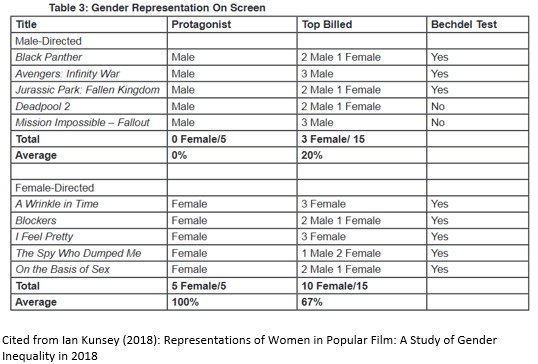
Additionally, he found women lacked both agency and superpowers in comparison to the male characters when the movies were directed by men. Female directors ensured women had more impact on the plot and even subverted classical male story types.
3. Flat, stereotypic characterization that shows women as incompetent: As this gets more and more called out, it’s not as obvious in recent movies. But historically the pretty, yet utterly brainless women who served only to highlight the man’s skills and appeal, were widespread. Some examples are Mary Goodnight from “The Man With The Golden Gun” (1974) or Kissy Suzuki from “You Only Live Twice” (1967).
4. Other tropes, such as the “damsel in distress”, are still to be found nowadays. This would include women who can have a three-dimensional characterization, even including some strengths, but still need to be rescued so the male hero can shine.
From one perspective it is great that the Loki series was directed by a woman. Not only is it a step toward balanced gender ratios behind the camera, but also female directors enable other women to join the casts and can impact our society by presenting stories of women.

However, the Loki series made extensive use of methods used in the past to discriminate against women, applied to men. In comparison to his female counterpart, Loki has little agency, is sexualized, the assault on him is normalized, and he is a stereotypical damsel in distress. Right in the first episode, Loki is stripped of his clothes, paving the way for excessive sexualization (point 1) by the audience. Similar to movies that downplayed the sexual assault of women, this scene never gets addressed again. The assault is not painted as unjust. In fact, the head writer referred to it as the “hottest Loki content ever seen” after it appeared first in a trailer. It’s supposed to equal bikini-spotting Bond girls, even though it’s clearly non-consensual in-universe.
Just like women, men can be victims of sexual assault. However, unlike women, men are not as easily believed when they speak out about being sexually assaulted. The shame of admitting being a victim paired with the poor chances for justice discourages men from filing charges, leading to a high number of unknown cases. I can only speculate if the wide spread denial of sexual assaults on men facilitates that so many people see the scene as “hot”. In-universe, the assault is not sexually motivated, but that makes the fact that the showrunners use an assault for sexualization is not less disturbing.
One scene of this sort could have been but an unfortunate accident that would not indicate an overarching theme. Sadly, it isn’t the only scene of this sort. In episode 4, Sif repeatedly kicks Loki in his groin. Loki repeatedly going down, wincing in pain, is supposed to be funny.
Neither the soundtrack nor the framing indicates an assault. Sif’s actions are justified by the show with the note that he cut her hair of. Natalie Holt’s additional information on preceding intercourse serve the same purpose: The attacker is justified. The victim deserved it.
Next: A lack of agency. From the first moments of the show Loki is either prisoner of the TVA or threatened by the environment, leaving him almost no agency, resulting in him having almost no impact on the plot. His discovery of Sylvie’s hiding places comes too late to avert her attack on the TVA. Since Sylvie can’t use magic in the TVA, her initial plan would have likely led to her capture. Loki’s attack and use of the TemPad led them to Lamentis, but in the end, both end up where they would have been without his interference, anyway: being prisoners of the TVA.
Even in the void at the end of all times, Loki fails to stir the plot. It is Mobius’ words that inspire Classic Loki to help them.
Loki subscribes to Sylvie’s goal of enchanting Alioth. Only in the finale does he oppose her – and gets promptly removed from the scene so he still does not influence the plot.
But the lack of agency isn’t all. While Loki shows a lot of powers during the series (illusions such as fireworks, drying his clothes, telekinesis, conjuring, arguably teleportation) they lack the power to chance anything. It’s Sylvie’s enchantment which is the key to breaking the TVA’s mind control of the variants. His part in this job is reduced to delaying her information that all employees of the TVA are variants to Mobius who takes it to Hunter B15.
Also, take a look how Sylvie and Loki are shown in the battle against Alioth.
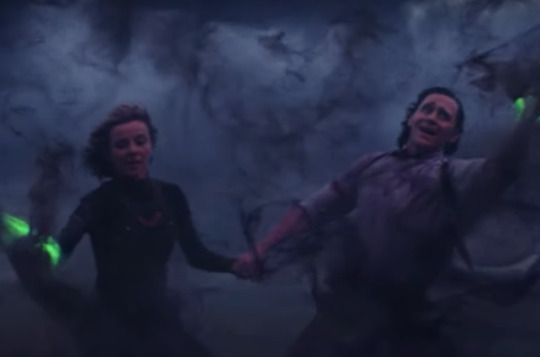
Yet Loki’s lack of power doesn’t stop with the supernatural. In Avengers 1, Loki holds up well against Captain America who is physically enhanced by the serum. In the show, he is overpowered by normal humans, such as Hunter B15 and struggles to hold up against the time keeper’s guards.
Let’s proceed to point 3 - characterized as imcompetent: Similar to the women mentioned in the beginning, Loki is frequently depicted as unreflecting, foolish and shallow. Threatened with the disintegration of his clothes he argues for “fine Asgardian leather”. Everyone should be aware that this bears no meaning for a robot. Additionally, it depicts his priorities as short-sighted. Later on, Loki fails to notice the importance of a time travel device during an ongoing apocalypse that leads promptly to the destruction of the device. His plans generally don’t work. Neither does the disguise as a train guard nor the persuasion of the old woman on Lamentis 1. His plot to stall the minutemen in episode 2 is immediately uncovered by Mobius (who, btw, is shown similarly inconsequential and inferior to his female counterpart Ravona Renslayer. Again, this hints that the series might generally be biased against men).
Loki’s lack of intelligence paves the way for the sexist trophy ‘damsel in distress’. Loki must be saved at several points of the series: The trial (ep.1), in the train (ep.3) when he fails to lay low and summons the wrong illusion, from Lamentis and from Alioth (ep.5).
As mentioned at the beginning, it happens again and again that people label primitive acts of retaliation against men for former discrimination against women as “feminism”. Often those acts of retaliation aim at individuals who did not commit discrimination against women.
Those acts cast a poor light on feminism and only add to the injustice. Far too often people confuse the desire for justice with the desire to be the one holding the whip. As a true feminist, this actions need to be judged as hard as sexism against women! Only that can be called equality.
A positive example of feminism was Black Panter. Not only was this the only male-directed movie from Kunsey’s analysis that could compete with the female-directed movies in terms of women behind the camera, strong female characters, female agency, and the Bechdel test but also it showed that the male protagonist could both be the butt of some jokes (“[He froze] like an antelope in headlights!”) and also get recognition with badass action scenes. Of course, men can also be ridiculed and display foolishness. But jokes on the expanse of characters have to be balanced and done with the care to keep it tasteful. As soon the portrayal goes too far into one direction there might be a bias in the production team. This is especially important if more than one representative of a social group gets targeted!
And of course both the stories of women and men need to be told. To achieve this the ratio of women amongst the directors needs to increase. There is no way arguing that. And even though I cannot bring myself to like Sylvie, Kate Harron put a lot of effort into telling her story. Both the plot and the framing aim to make her the center of the plot and urge the audience to connect with her. She inspired many fans with this depiction of a strong female character. People praise the Loki show as progressive because of it.
But why did she had to pair this with the bashing of a man/genderfluid person? Can’t a woman not be strong without degrading another person? For me – a woman – such a portrayal is weakened if it is on someone’s expense. In fact, I realized one of the main points that sours her characterization for me is that harsh contrast between her and our Loki. She is competent where he is lacking, her pain validated where his is dismissed, her goal gets achieved while he fails.
Black Panther proved that a director and his team can produce an awesome story that provides decent representation for black people! But as Kunsey pointed out it did generally a wonderful job with representation, including those of women! They made an effort for equally behind the scenes. Okoye’s and Nakia’s characterizations show objective strength; they do not depend on bashing of males. In contrast, the Loki show proves female directors might not be the best choice when it comes to telling the story of a man or - as in this case - a predominantly male-presenting genderfluid person. Kate Herron was granted a rare opportunity that called for consideration.
The Loki show is named after the character Tom Hiddleston plays ever since Thor 1 (2011). Making his show about a female variant of Loki is fraudulent labeling. Using trailers where Sylvie is digitally removed is false advertising.
Perhaps Herron’s actions won’t cast poor light on other female directors. But it is undeniable that Loki has an enormous fandom and the show was watched by millions of people. Kate’s normalization of assaults against men might still contribute to abuse and aggression.
With great power comes great responsibility!
If you are given a chance like Herron was, you have the responsibility to use it wisely. And that excludes bashing of others because of their genders.
Our aim has to be equality and respect.
261 notes
·
View notes
Text
Loki series criticism links under the cut.
https://m.youtube.com/watch?v=DlXf_TOR0GY&feature=youtu.be
youtube
https://t.co/KPfiwAlgth
https://twitter.com/featherfiction/status/1429389562489589761?s=21

https://twitter.com/nuwandavision/status/1427415169441820679?s=21

https://twitter.com/juliadelbel/status/1426265253088829443?s=21
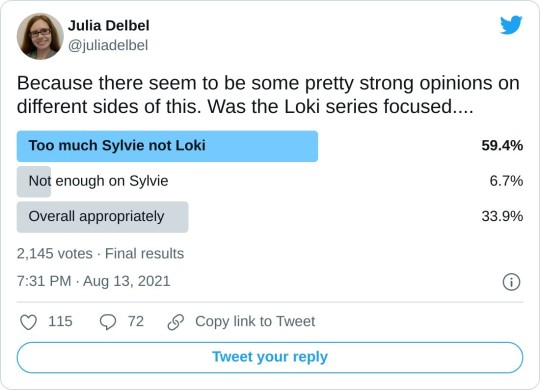
https://twitter.com/diolesbian/status/1416408887889211392?s=21
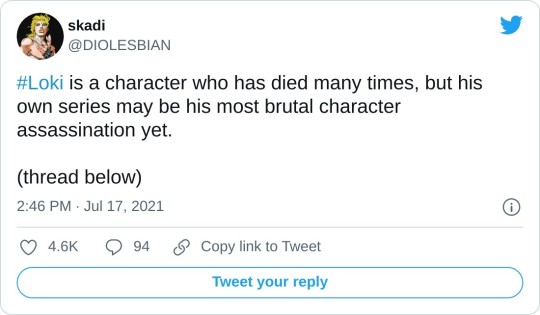
47 notes
·
View notes